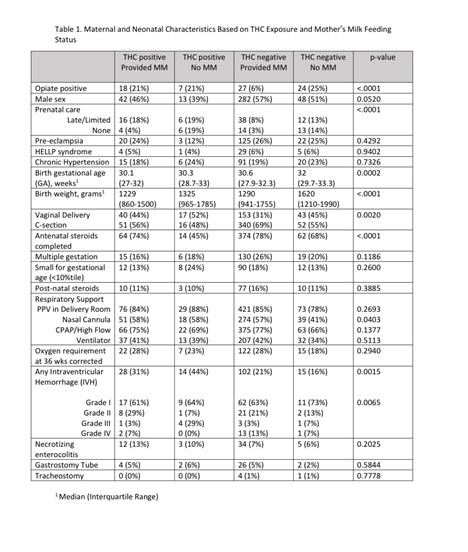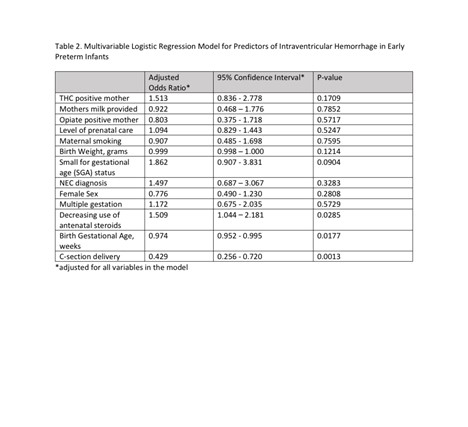Research to be presented at the 2021 American Academy of Pediatrics National Conference & Exhibition found no negative impact of exposure to breast milk from THC-positive women on preterm babies before hospital discharge; doctors caution long-term effects still unknown and recommend avoiding marijuana use if pregnant or nursing
ITASCA, IL – Legalization of marijuana has been associated with increased use in women of childbearing age. Since tetrahydrocannabinol (THC), one of the active ingredients in marijuana, passes through breast milk, many neonatal intensive care units (NICUs) restrict the use of breast milk from THC-positive women because the effects on early preterm infants are unknown. However, science has shown that feeding these preterm babies breast milk is one of the best ways to improve their outcomes and leads to fewer infections and intestinal issues, improved brain growth, and better overall development compared to feeding them infant formula.
The study abstract, “Maternal Marijuana Use During Pregnancy and Breastfeeding: Assessing In-Hospital Outcomes of Early Preterm Infants,” to be presented at the virtual American Academy of Pediatrics National Conference & Exhibition, analyzed the medical records of 763 early preterm infants from 2014 to 2020. Researchers found 17% of their mothers tested positive at the time of delivery for THC.
“Providing breast milk from THC-positive women to preterm infants remains controversial since long-term effects of this exposure are unknown,” said Natalie L. Davis, MD, MMSc, abstract author and Associate Professor of Pediatrics at the University of Maryland School of Medicine and Attending Neonatologist at the University of Maryland Children’s Hospital. “For this reason, we continue to strongly recommend that women avoid marijuana use while pregnant and while nursing their babies. Our study, however, did provide some reassuring news in terms of short-term health effects. It definitely indicates that more research is needed in this area to help provide women and doctors with further guidance.”
Researchers compared early preterm infants who were fed breast milk from THC-positive mothers to those who were fed either formula or breast milk from THC-negative mothers and found no differences in short-term health impacts such as breathing difficulties, lung development, and feeding issues. Overall, early preterm babies born to mothers who tested positive for marijuana at delivery were similarly healthy by the time of their discharge when fed their mother’s breast milk compared to those who did not receive their mother’s breast milk.
“Teasing out the effects of THC can be very difficult to study,” Dr. Davis said. “We found that women who screened positive for THC were frequently late to obtain prenatal care, which can have a detrimental effect on their baby separate from marijuana use. This is important to note for future public health interventions.”
To request an interview, journalists may contact: Stephanie Janard, Media Relations, University of Maryland Children’s Hospital, or Deborah Kotz, Media Relations, University of Maryland School of Medicine.
Please note: only the abstract is being presented at the meeting. In some cases, the researcher may have more data available to share with media or may be preparing a longer article for submission to a journal.
# # #
The American Academy of Pediatrics is an organization of 67,000 primary care pediatricians, pediatric medical subspecialists and pediatric surgical specialists dedicated to the health, safety and well-being of infants, children, adolescents and young adults. For more information, visit www.aap.org.
Program Name:
Abstract Title: Maternal Marijuana Use During Pregnancy and Breastfeeding: Assessing In-Hospital Outcomes of Early Preterm Infants
Natalie Davis
Baltimore, MD, United States
Saturday, October 9, 2021: 9:31 AM –
Legalization and decriminalization of marijuana has been associated with increased use in women of child-bearing age. Since tetrahydrocannabinol (THC) has been shown to pass into breast milk, concern exists not only for the effects of prenatal exposure, but also for post-natal exposure via mother's milk (MM). Our neonatal intensive care unit (NICU) allows provision of MM for early preterm infants regardless of THC status, though many will restrict MM use in this scenario given concerns about effects on the neonate. Our objective was to evaluate differences in outcomes between neonates who did vs. did not have exposure to THC prenatally and postnatally via MM.
Retrospective medical record review of early preterm (<34 weeks gestational age, GA) neonates born 9/2014-12/2020 and admitted to our Level IV NICU. Our institution conducts universal urine toxicology and substance use screens on mothers admitted to labor and delivery. We compared maternal and neonatal characteristics in four cohorts: 1) THC positive moms providing MM, 2) THC positive moms who provided no MM, 3) THC negative moms who provided MM, 4) THC negative moms who provided no MM. We performed multivariable analyses to assess the effect of THC and MM status on significant outcomes.
We identified 763 early preterm neonates, of whom 59% (n=448) were non-Hispanic Black and 31% (n=233) were non-Hispanic White. Seventeen percent (n=130) of mothers tested positive for THC. Mothers positive for THC were more likely to be late to prenatal care (PNC) while those who did not provide MM were more likely to receive no PNC (p<0.0001). There were no significant differences between the 4 cohorts in regards to growth restriction, oxygen requirement at 36weeks, necrotizing enterocolitis, ventilator requirement, and tracheostomy requirement. However, we did find increased incidence of all grade intraventricular hemorrhage (IVH) in those infants who were THC exposed (p=0.0015), though the largest incidence overall and specifically of grade III/IV IVH was in THC exposed infants without MM. We therefore performed logistic regression for predictors of IVH in early preterms and found that when controlling for variables such as birth weight, neither THC status (p=0.18) nor MM status (p=0.79) significantly predicted IVH in early preterms. The only significant predictors were antenatal steroids, delivery mode, and birth GA.
Providing MM from THC positive women to early preterm neonates is controversial as the longer term effects of this exposure are unknown. In our study, we found no evidence that providing MM from THC positive mothers was detrimental to the health of this early preterm population through hospital discharge. A better understanding of longer term perinatal outcomes associated with THC exposure both in-utero and postnatally via MM would inform appropriate interventions to improve clinical outcomes and safely encourage MM provision for early preterm infants.
Table 1. Maternal and Neonatal Characteristics Based on THC Exposure and Mother’s Milk Feeding Status

Table 2. Multivariable Logistic Regression Model for Predictors of Intraventricular Hemorrhage in Early Preterm Infants
